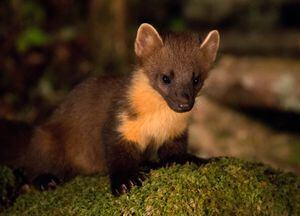Pine Martens return to mid Wales
The pine marten has returned to the woodlands of mid-Wales, thanks to a pioneering project to restore this native mammal to a region in which it once thrived.

Between 2015 and 2017, over 50 martens were brought from Scotland to the woodlands of mid-Wales where they were on the brink of extinction. The animals are breeding successfully as they settle into their new home.
The Vincent Wildlife Trust is now launching a new survey to collect information on the spread of this new pine marten population across Wales and the Marches. It is appealing for enthusiastic volunteers to collect data on pine marten distribution, from collecting scats - droppings - and using remote trail cameras.
To help new volunteers the trust will be running training courses during the spring and will provide all the information and equipment needed to carry out the surveys.
Its science and research manager, Dr Jenny MacPherson, said, ‘Volunteers were crucial in helping us to collect data from the first phase of the Pine Marten Recovery
Project and we are, once again, looking forward to working with volunteers to help us understand more about how pine martens expand their territories and how their
populations grow. This is a great opportunity for members of the local communities to become involved in scientific research that will inform other projects nationally.’
Pine marten volunteer, Aline Denton, said: "It has been such an exciting project to be involved with and I feel very privileged to have been able to volunteer for VWT. It has
been fantastic to be part of something that will leave a lasting legacy to mammal conservation in Wales."
The Pine Marten is a native British mammal and one of the rarest mammals in the UK. Pine Martens are a member of the mustelid family, which includes the weasel, stoat, otter and polecat. They are the size of a small domestic cat, with rich brown fur, a creamy yellow bib, prominent rounded ears and a long bushy tail. They prefer woodland habitats and use tree cavities as breeding and resting sites but will also use craggy areas. They are mainly nocturnal.
Newtown's Iolo Williams, naturalist, TV presenter and patron of the Pine Marten Recovery Project, said: "Having searched high and low for years for pine martens in Wales and without success, it is so heartening to know that these animals are back in their former haunts once more. The work the VWT is doing is absolutely brilliant."





